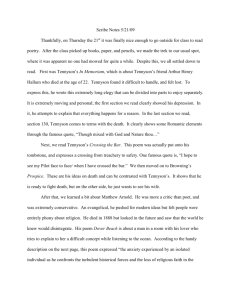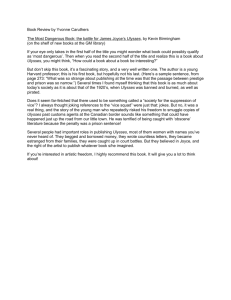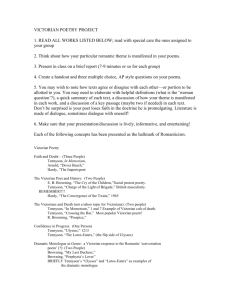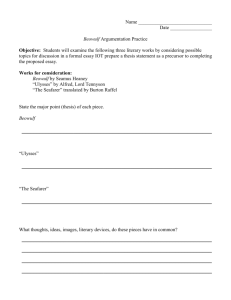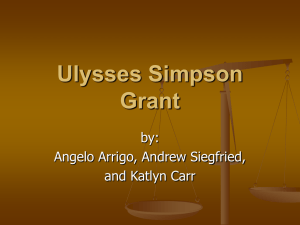Ullysses - Year 12 English Lit Blog
advertisement
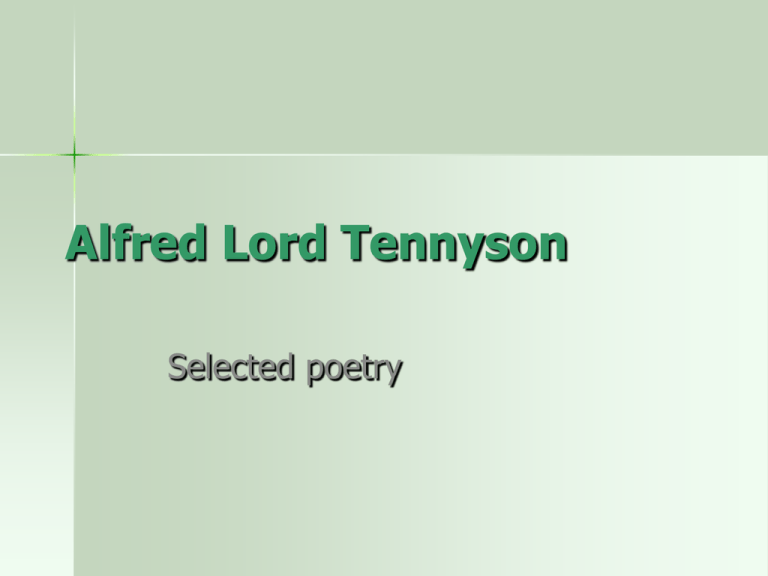
Alfred Lord Tennyson Selected poetry Common themes & ideas in Tennyson’s poetry Praised for his ability to create musical lyrics Master of a number of verse forms Attempted to capture and deal thoughtfully with the problems of his age in his poetry. He also dealt with the more generic issues that faced and affected all men such as death, loss and a nostalgic yearning for a more stable world. 20th century responses to Tennyson (context of reception) Post WW1 condemned Tennyson for pandering to Victorian public demands that poetry be uplifting, contain a moral and avoid controversial subjects. Between the world wars critics spoke of the ‘two Tennysons’. The first was condemned for preaching jingoism and offering moral platitudes. The second was valued as a morbid introvert whose achievement lay in his lyrics with their private symbolism developed to express personal anxieties and frustrations. Critics since WW2 have been generally more appreciative of the entire canon of Tennyson’s poetry. Ulysses Who is he? A mythological hero. Ulysses (Latin / Roman) – 3 ‘S’ letters mirror watery sounds, the ocean - setting then becomes a metaphor for life / journey of life – its ups and downs. Odysseus (Greek, Odyssey, meaning journey) The source for a variety of literary works; his character and behaviour can be interpreted in contrasting lights. Who is he? According to myth, Ulysses (Odysseus) was one of the Greek kings who went to war with Troy after the abduction of Helen by Paris. He came up with the wooden horse idea, as told in Homer’s Iliad . Homer’s Odyssey focuses on the 10 year period after the Trojan wars, when Ulysses wandered through the Mediterranean, visiting islands, gradually losing all his fellow sailors and eventually returning to reclaim his kingdom of Ithaca. Who is he? His wife, Penelope, has remained faithful to him despite his long absence She has kept suitors at bay by saying she will not marry until she has finished weaving a shroud for her father-in-law, Laertes Each night she unpicks the work she has done on the shroud until a serving maid betrays her to the suitors Who is he? Odysseus returns disguised as a beggar and sees that Penelope has remained faithful to him She announces that she will marry whoever can string Odysseus’ bow and shoot an arrow through 12 axe heads Odysseus (still in disguise) wins the contest and then kills the other suitors He reveals his true identity to Penelope and they are reunited Tennyson’s sources The eleventh book of Homer’s Odyssey which foretells that Ulysses, after his return, will set off on another voyage. Dante’s Inferno (canto xxvi), where Ulysses is in hell for the sin of fraud and guile – he tells the story of his death at sea on a final voyage. Tennyson’s Ulysses After having been home for some time, Ulysses expresses his dissatisfaction with his life of inaction. Idle, he is confined to Ithaca with his now ancient wife, Penelope, and his ‘savage’ people. He believes that there is no end to experience; no end to his desire for new experience and for knowledge. Despite his little time left on earth, he feels he must strive to gain more experiences and more knowledge. Tennyson’s Ulysses He does not fear Death in itself, but accepts it as inevitable – death may close all OR may begin the journey to Elysia… Life is precious therefore it should all be experienced for as long as possible. Why did Tennyson write Ulysses? Son of Reverend George Clayton Tennyson, (Rector of the church at Somersby, Lincs in early 19th century), Tennyson entered Trinity College, Cambridge (1828) and found soul mates in ‘The Apostles’ (a literary and social debating society) where he met Arthur Henry Hallam. Why did Tennyson write Ulysses? At Cambridge in 1828, Tennyson meet Arthur Hallam, who becomes his dearest friend Five years later, Hallam dies unexpectedly of a fever. Great depression in Tennyson leads to ‘In Memoriam’, ‘Tithonus’, and ‘Ulysses’. “Ulysses was written soon after Arthur Hallam’s death and gave my feeling about the need of going forward and braving the struggle of life perhaps more simply than anything in ‘In Memoriam’.” Tennyson Form .... A dramatic monologue: the entire poem is spoken by a single character, whose identity is revealed by his own words. Unrhymed, blank verse in iambic pentameter of unstressed / stressed syllables – mirroring the natural cadences of speech. More open, heartfelt, personal – mirroring heart-beat. •First person narrative – the perspective makes Ulysses’ voice and feelings more immediate, realistic, involving, passionate. •Lack of rhyme, use of enjambment, caesura and various punctuation also reflects more natural speech ... and Structure ... Many of the lines are enjambed: a thought does not end with the linebreak; sentences often end in the middle rather than the end of the lines. This use of enjambment is appropriate in a poem about pushing forward "beyond the utmost bound of human thought.“ The poem is divided into four paragraphlike sections, each of which comprises a distinct thematic unit of the poem. The poem deals with issues of discontentment and unease. It contrasts the boredom of everyday life with the excitement of adventure. It suggests death is close. 19th century readers saw only noble perseverance in this poem. The modern reader is aware of the tensions they were happy to ignore. •Dramatic monologue •Blank verse (iambic pentameter) Negative, bitter, resentful narrator infects his environment It little profits that an idle king, By this still hearth, among these barren crags, Give out Match'd with an aged wife, I mete and dole Unequal laws unto a savage race, Unsavoury attitude towards his people too That hoard, and sleep, and feed, and know not me. Appears to be disgusted with his people and their need to indulge in normal human behaviour. His selfcentredness is absolute; his only concern is himself •Monosyllabic, negative verbs •Lack of energy or drive reinforced by adjectives •Hard sounds Particularly harsh description considering Penelope waited faithfully for 10 years for his return! Self-centred dregs Imagery of consuming emphasises his egocentricity I cannot rest from travel: I will drink Life to the lees: all times I have enjoyed Greatly, have suffered greatly, both with those A group of That loved me, and alone; on shore, and when stars – their name thought Through scudding drifts the rainy Hyades Vexed the dim sea: I am become a name; to be derived from the For always roaming with a hungry heart Greek for rain; Much have I seen and known; cities of men the stars were And manners, climates, councils, governments, assumed to be Myself not least, but honoured of them all; omens of And drunk delight of battle with my peers; rainy weather Far on the ringing plains of windy Troy. Possible reference to attitudes towards British colonialism in 19th century . Similar to Ulysses’ approach - the British would devour the world; use, abuse and destroy it. The city the Greeks besieged for 10 years, before finally destroying it I am a part of all that I have met; Yet all experience is an arch where through Gleams that untravelled world, whose margin fades For ever and for ever when I move. A Ulysses we can Not shiny; How dull it is to pause, to make an end, sympathise with: a not polished To rust unburnished, not to shine in use! visonary keen to As though to breathe were life. Life piled on life escape the mundane emptiness of an Were all too little, and of one to me aimless life. Little remains: but every hour is saved Discarding From that eternal silence, something more, governance and A bringer of new things; and vile it were rejecting mediocrity For some three suns to store and hoard myself, in favour of something inspiring And this grey spirit yearning in desire and uplifting. To follow knowledge like a sinking star, Beyond the utmost bound of human thought. An ornamental stick carried by a king. Also possible reference to Shakespeare’s description of Britain in Richard II – ‘this sceptred isle’ – in which Britain is described as being in a terrible state, because it is poorly led. Ulysses’ son Supports the This is my son, mine own Telemachus, Wise, careful, Victorian selfTo whom I leave the sceptre and the isle — confidence of skilful spreading the Well-loved of me, discerning to fulfil behaviour This labour, by slow prudence to make mild Christian faith to the A rugged people, and through soft degrees ‘uncivilised’ Subdue them to the useful and the good. worlds of Most blameless is he, centred in the sphere benighted Greeks and foreigners in Of common duties, decent not to fail Romans had Africa, Asia In offices of tenderness, and pay shrines in their etc. Meet adoration to my household gods, When I am gone. He works his work, I mine. Everyday activities; normal life What impression of Telemachus do Ulysses’ words give? houses, where they worshipped their favourite gods Sailors Full of fun; happy There lies the port; the vessel puffs her sail: There gloom the dark broad seas. My mariners, Souls that have toil'd, and wrought, and thought with me — That ever with a frolic welcome took The thunder and the sunshine, and opposed Free hearts, free foreheads — you and I are old; Old age hath yet his honour and his toil; Death closes all: but something ere the end, Some work of noble note, may yet be done, Not unbecoming men that strove with Gods. Does death conflict with this exciting aspiration or does it chime eerily with it? Hallam’s death caused Tennyson to wonder whether death was preferable to life. Tennyson’s belated Romanticism provides a different context for this idea; Shelley and Keats both died young. The sense that Tennyson felt he was trapped in a life of decay and failure may be seen as a reflection of his own unworthiness and unwillingness to commit to the more dangerous implications of the Romantic way of life. Dies away; fades Tennyson as well as The lights begin to twinkle from the rocks: Ulysses The long day wanes: the slow moon climbs: the deep Moans round with many voices. Come, my friends, 'Tis not too late to seek a newer world. Push off, and sitting well in order smite The Isles of the The sounding furrows; for my purpose holds blest were a kind To sail beyond the sunset, and the baths of Greek heaven Of all the western stars, until I die. for heroes It may be that the gulfs will wash us down: Does Tennyson want It may be we shall touch the Happy Isles, to join Hallam, Keats And see the great Achilles, whom we knew and Shelley; be Tho' much is taken, much abides; and though accepted into the We are not now that strength which in old days pantheon of Moved earth and heaven; that which we are, we are; Romantic heroes? One equal temper of heroic hearts, Made weak by time and fate, but strong in will Self-confident resilience To strive, to seek, to find, and not to yield. OR stasis on old age? Forceful determination could suggest suicide as well as the pursuit of adventure 1. 2. 3. 4. Loosely structured around 4 narrative sections: Opening – framing device – present (1-5) Past reflections – point of contrast created (632) Present – focus on son (33-43) Present / future – determination to sail away (44-70) Final stanza has an urgency and forward motion, helped by strong auditory imagery – thunder / moans / voices / sounding - (4 infinitives at the end – climax – always continuing – reinforced through iambic meter). Contrasts Use of past / present Listing devices Magnitude of achievements Imagery of consumption Metaphors (‘arch of experience’) Imagery – heavenly, ocean, nature 1st and 2nd sections contrast with 3rd and 4th – hoard, feed, drinking and eating experience contrast with intangible, heroic life. The anxiety, the death-wish and the politically bitter rhetoric all clash against the poem’s central drive towards a rousing conclusion of determined adventuring. It is these disturbances that make the poem most interesting; without them it would be hollow and blaring; with them it becomes a poem about the turbulence of the grieving imagination’s desire to pursue a life of fulfilment even as it encounters the realisation that such a life may, in fact, be lost beyond recovery.
